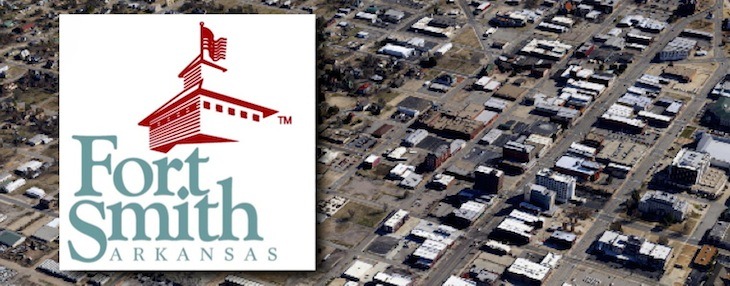Police, fire dispatch system part of Fort Smith budget priorities, new city hall discussed
by June 23, 2019 1:42 pm 775 views

The Fort Smith Board of Directors decided to keep most of the city-wide budget goals set in 2019 as priorities for the 2020 budget at a special budget study session Friday (June 21).
The list of goals includes 12 items and lists four spending priorities for the budget as the No. 1 point. Those spending priorities include police department critical equipment, pay increase for employees, additional LOPFI (police and fire pension) contributions to reduce the outstanding pension liabilities and a General Fund Capital Improvement Program. These are the same four spending priorities set in the 2019 budget.
Interim Chief Danny Baker said he did not think the department would need to keep having that item on the budget priority list because of a seven-year plan approved with the 2019 budget that has the department’s fleet receiving a number of new vehicles each year.
“With that, I think we’re going to be OK for equipment,” Baker said.
Fort Smith City Administrator Carl Geffken said the equipment item needs to remain a priority in order to continue funding the vehicles and other key components of the seven-year plan, which include a possible second precinct and training facility. Baker also noted the police and fire department is in need of a new dispatch system. Fort Smith Fire Chief Phil Christensen said it is important that the city update its dispatch system.
“What we have now has been in place since the 1990s. So it’s just archaic,” Christensen said.
A big part of the new system would be updated software, but there would be the need for some new hardware as well, Geffken said. A new system would allow both departments to better respond to emergency calls and serve the city. It would allow firetrucks to have tablets that show road closures and other vital information personnel need when responding to a call, Christensen said.
Other key aspects of the budget priority list, to be used when drafting the 2020 budget include:
• Implementation of the Future Fort Smith Comprehensive Plan and vision statement into the operating and capital budgets;
• Additional recreation through use of Parks Capital Improvement funds to continue improvements to Riverfront Drive properties and continue construction of trails according to priorities identified in the updated Trails & Greenways Master Plan; and
• Economic growth strategies to increase the job market with higher paying jobs as well as support the construction of Interstate 49, regional intermodal freight facilities, and improvements/maintenance of the Arkansas River navigation system in order to capitalize on the City’s strategic position at the crossroads of highways, rail, and navigable waterways.
Director Lavon Morton said he would like to see wordage added to the fourth priority that would include help and incentives for existing Fort Smith business who are trying to expand and create more jobs for the city. Other directors agreed that would be a good addition to the priority. Director Kevin Settle suggested scheduling a joint study session with the Fort Smith Regional Chamber of Commerce to discuss economic development incentives.
The remainder of the priorities include:
• Support riverfront development, restoration and the revitalization of downtown into a prominent multipurpose center of activity;
• Preserve, protect, and revitalize the city’s neighborhoods with continued proactive code enforcement, community beautification, public sidewalk improvements, and planting parkway trees;
• Continue compliance with the federal consent decree for wet weather sanitary sewer system improvements in order to alleviate the occurrence of backups and overflows;
• Educate and inform the community, legislators, and other stakeholders on the funding obligations for police and fire pensions;
• Continue converting portions of the city’s fleet to alternatively-fueled vehicles;
• Support sustainable tourism development initiatives in the city by partnering with local organizations as tourism partners;
• Build, establish, and maintain a communication strategy to educate citizens and increase community awareness of programs, activities, projects and accomplishments; and
• Evaluate the following personnel reduction; contract compliance and administrative services; city hall location; and language to address LOPFI funding parameters and to address capital purchases.
All of the above were listed as priorities in 2019. When Director André Good asked for an update on the possibility of new city hall, Geffken said discussions were underway regarding three possibilities for a building that could hold the city hall, making it more convenient for customers needing to conduct city business and employees by having everything located under one roof.
Of the three buildings being considered, one is located downtown and one south of downtown with one “located very centrally in the city,” Geffken said. Two of the buildings would be purchases; one would be a long-term lease.
“Each of these have a cost to them. There is discussion about how renovations would be taken care of,” Geffken said. “Would it be cost neutral? I do not think so, but it would benefit the city and residents.”
